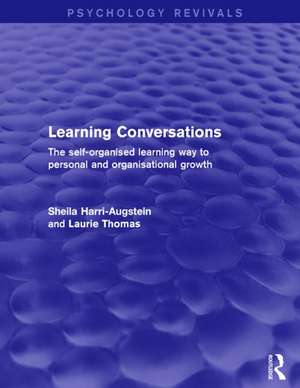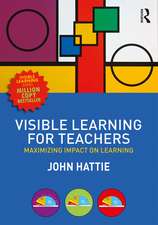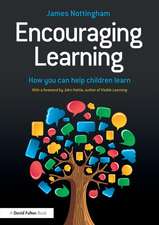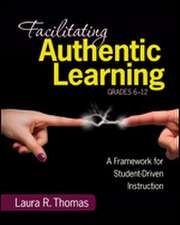Learning Conversations (Psychology Revivals): The Self-Organised Learning Way to Personal and Organisational Growth: Psychology Revivals
Autor Sheila Harri-Augstein, Laurie Thomasen Limba Engleză Hardback – 17 dec 2013
How Can You Enhance Your Potential for Change and Personal Growth?
Most of us accept that education does not meet the needs of learners today, or their employers. This mismatch is a key reason why a high level of demotivated youth, as well as workers and managers remain unable to develop themselves. They have been other-organised and are unprepared for the world of work and the challenges of life.
First published in 1991, this title offers a radical approach to human learning and personal change. Based on the reflective procedures of Learning Conversations, it enables a deep exploration of the learning process and allows individuals, teams and even whole organisations to create dynamic learning cultures capable of adaptive, constructive and continuing growth.
Available again after some years this book is as relevant, if not of greater value, in our ever-changing society than when originally published.
| Toate formatele și edițiile | Preț | Express |
|---|---|---|
| Paperback (1) | 145.32 lei 6-8 săpt. | |
| Taylor & Francis – 12 iun 2015 | 145.32 lei 6-8 săpt. | |
| Hardback (1) | 1326.99 lei 6-8 săpt. | |
| Taylor & Francis – 17 dec 2013 | 1326.99 lei 6-8 săpt. |
Din seria Psychology Revivals
- 9%
 Preț: 800.46 lei
Preț: 800.46 lei - 9%
 Preț: 940.09 lei
Preț: 940.09 lei -
 Preț: 326.49 lei
Preț: 326.49 lei - 18%
 Preț: 661.73 lei
Preț: 661.73 lei -
 Preț: 246.17 lei
Preț: 246.17 lei - 9%
 Preț: 903.58 lei
Preț: 903.58 lei -
 Preț: 258.67 lei
Preț: 258.67 lei - 5%
 Preț: 218.55 lei
Preț: 218.55 lei - 9%
 Preț: 1460.68 lei
Preț: 1460.68 lei -
 Preț: 258.67 lei
Preț: 258.67 lei -
 Preț: 338.40 lei
Preț: 338.40 lei - 5%
 Preț: 265.78 lei
Preț: 265.78 lei -
 Preț: 341.57 lei
Preț: 341.57 lei -
 Preț: 401.26 lei
Preț: 401.26 lei - 28%
 Preț: 992.63 lei
Preț: 992.63 lei - 44%
 Preț: 724.77 lei
Preț: 724.77 lei - 19%
 Preț: 290.61 lei
Preț: 290.61 lei - 28%
 Preț: 989.34 lei
Preț: 989.34 lei - 28%
 Preț: 552.60 lei
Preț: 552.60 lei - 28%
 Preț: 820.71 lei
Preț: 820.71 lei - 26%
 Preț: 846.09 lei
Preț: 846.09 lei - 18%
 Preț: 1053.33 lei
Preț: 1053.33 lei - 18%
 Preț: 1061.19 lei
Preț: 1061.19 lei - 25%
 Preț: 964.75 lei
Preț: 964.75 lei - 18%
 Preț: 1164.12 lei
Preț: 1164.12 lei - 28%
 Preț: 850.59 lei
Preț: 850.59 lei - 28%
 Preț: 847.73 lei
Preț: 847.73 lei - 29%
 Preț: 594.33 lei
Preț: 594.33 lei - 28%
 Preț: 825.21 lei
Preț: 825.21 lei - 27%
 Preț: 1049.90 lei
Preț: 1049.90 lei - 28%
 Preț: 1046.65 lei
Preț: 1046.65 lei - 21%
 Preț: 906.17 lei
Preț: 906.17 lei - 28%
 Preț: 848.15 lei
Preț: 848.15 lei - 5%
 Preț: 1423.10 lei
Preț: 1423.10 lei - 28%
 Preț: 819.48 lei
Preț: 819.48 lei - 18%
 Preț: 1055.21 lei
Preț: 1055.21 lei - 18%
 Preț: 1284.97 lei
Preț: 1284.97 lei - 26%
 Preț: 819.48 lei
Preț: 819.48 lei - 29%
 Preț: 1299.62 lei
Preț: 1299.62 lei - 27%
 Preț: 1022.07 lei
Preț: 1022.07 lei - 28%
 Preț: 847.73 lei
Preț: 847.73 lei - 25%
 Preț: 964.32 lei
Preț: 964.32 lei - 26%
 Preț: 819.90 lei
Preț: 819.90 lei - 21%
 Preț: 906.17 lei
Preț: 906.17 lei - 28%
 Preț: 849.84 lei
Preț: 849.84 lei - 5%
 Preț: 1413.77 lei
Preț: 1413.77 lei - 29%
 Preț: 622.59 lei
Preț: 622.59 lei - 20%
 Preț: 1062.55 lei
Preț: 1062.55 lei - 18%
 Preț: 1063.44 lei
Preț: 1063.44 lei - 18%
 Preț: 876.27 lei
Preț: 876.27 lei
Preț: 1326.99 lei
Preț vechi: 1618.28 lei
-18% Nou
Puncte Express: 1990
Preț estimativ în valută:
253.95€ • 275.75$ • 213.32£
253.95€ • 275.75$ • 213.32£
Carte tipărită la comandă
Livrare economică 22 aprilie-06 mai
Preluare comenzi: 021 569.72.76
Specificații
ISBN-13: 9781138016576
ISBN-10: 1138016578
Pagini: 404
Dimensiuni: 189 x 246 x 24 mm
Greutate: 0.45 kg
Ediția:1
Editura: Taylor & Francis
Colecția Routledge
Seria Psychology Revivals
Locul publicării:Oxford, United Kingdom
ISBN-10: 1138016578
Pagini: 404
Dimensiuni: 189 x 246 x 24 mm
Greutate: 0.45 kg
Ediția:1
Editura: Taylor & Francis
Colecția Routledge
Seria Psychology Revivals
Locul publicării:Oxford, United Kingdom
Public țintă
Postgraduate, Professional, and UndergraduateCuprins
General Introduction: Personal Myths About Learning. Part 1: Learning Prospective Commentary: Creating a Language for Discovering What Learning Might Become 1. The Learning Process: A Search for Meaning 2. Constructing Understanding: Meaning as Modelling. Retrospective Commentary: S-O-L as a Way of Increasing Your Learning Capacity by Reflectively Organising Your Own Learning Processes Part 2: The Learning Conversation Prospective Commentary: Task-Bound, Task-Focused and Learning Focused Activity – The Way to Self-Organised Learning 3. On Becoming Aware of Personal Processes of Learning 4. How to Conduct a Learning Conversation. Retrospective Commentary: How to Take Control of Learning and Enable Others to Internalise the Learning Conversation Part 3: Self-Organised Learning Environments Prospective Commentary: Creating the Conditions to Enable Self-Organised Learning 5. The Learning Practitioner: Organising a System of Learning Conversations 6. Conversational Evaluation and Purposive Change: The Enterprise as a Self-Organised Learning Environment. Retrospective Commentary: The Implications of Systems 7 for Industrial and Commercial Training and Education. A Functional Taxonomy of Reflective Tools Introduction: Increasing the Power of the Learning Conversation – a Resource for the Learner and the Learning Practitioner A. Tools for Increasing Awareness of Learning Processes: Representing Personal Meaning for Reflecting on Experience B. Tools for Increasing Awareness of Learning Processes: Reconstructing Experience by Talk-Back Through Records of Behaviour C. Experience and Behaviour Expanded into Purpose and Review: An Elaboration of the Functional Taxonomy D. Charting Progress as a Self-Organised Learner E. Tools from Education and Training. Conclusions: S-O-L and the Enhancement of the Quality of Learning . General Implications: Towards the Self-Organised Learning Society. Postscript: the Centre for the Study of Human Learning S-O-L Environment and Information Technology. Index
Descriere
First published in 1991, this title offers a radical approach to human learning and personal change. Based on the reflective procedures of Learning Conversations, it enables a deep exploration of the learning process and allows individuals, teams and even whole organisations to create dynamic learning cultures capable of adaptive, constructive and continuing growth.
Available again after some years this book is as relevant, if not of greater value, in our ever-changing society than when originally published.
Available again after some years this book is as relevant, if not of greater value, in our ever-changing society than when originally published.









